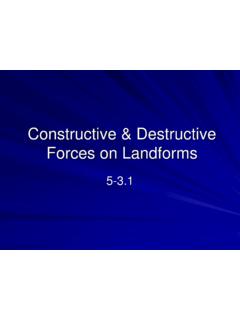Transcription of Primary Sources: Andrew Jackson's Letter to the Cherokee
1 Primary Sources: Andrew Jackson's Letter to the Cherokee By Original document from the public domain, adapted by newsela staff on Word Count 1,211. The Indian Removal Act resulted in the forced move westward of several Native American tribes in what the Cherokee called the "Trail of Tears." Photo: Nikater, Wikimedia Commons Editor's Note: In the early 19th century, white settlers wanted to claim the Native American- held lands east of the Mississippi River (including what is now Alabama, Georgia and Mississippi). Though some of this territory would be seized through warfare, the United States government attempted to set up treaties with the tribes living there. In theory, the Native Americans would be compensated with ample land and provisions if they willingly chose to move west, but the Indian Removal Act of 1830, signed by President Andrew jackson , forced the relocation of the tribes.
2 After a group of Cherokee leaders signed one such treaty in 1835, state and federal troops rounded up members of the tribe and marched them to their new settlement. Conditions were horri c, and about 4,000 Cherokee died en route. This march would later be known as the Trail of Tears. This Letter led to the treaty. "Great Concern For Your Situation". To the Cherokee Tribe of Indians east of the Mississippi River. MY FRIENDS: I have long viewed your situation with great interest. For many years I have been involved with your people in peace and war. Your fathers were well-known to me, and the respect I felt for them has caused me to feel great concern for your situation. To these feelings, growing out of my memories, I must add the job of being the president that must follow the Constitution and laws.
3 So listen to me as your fathers have listened and I will communicate to you my thoughts on the problems you now face. You are now placed in the midst of a white population where your own customs and rules have been ended and you are now subject to the same laws which govern the other citizens of Georgia and Alabama. Most of your people are uneducated, which could lead to trouble with their white neighbors. Your young men are starting to form bad habits and are often drunk. They have strong passions they cannot control, so they will break laws which will end in their ruin. There is no more game to hunt and you must depend upon agriculture and other jobs for support. Many of your people have bought little or no land and you have no personal property, so how then can you live in the country you now occupy?
4 Your condition will become worse, and you will eventually disappear, as so many tribes have done before you. "I Warned Your People". Of all this I warned your people when I met them in council 18 years ago and advised them to sell their possessions east of the Mississippi and to move to the country west of that river. This advice I have continued to give you to the present day. Had you then listened and moved west, you would have established yourselves in a fertile country and been beyond the reach of the evils that now threaten your destruction. Instead of being a divided people as you now are, ghting with each other, you would have been a rich and a united community. Your farms would have been open and cultivated, comfortable houses would have been built and you would have been governed by your own customs and laws.
5 Over the last few years you have listened to your leaders and rejected the generous offers that promised to improve your condition, yet the advice of these men has not improved your lives. I have no motive, my friends, to deceive you. I sincerely want to promote your welfare. Listen to me while I tell you that you cannot remain where you now are. Situations that cannot be controlled make it impossible that you can survive in these areas. You have but one remedy within reach, and that is to move west soon and join your countrymen who are already established there. A number of your brethren, who have been chosen by your people who want to move west, have come to Washington, , in the hope of making some arrangement that would meet your approval.
6 They have clearly stated that whatever they did must be approved by all. "The Agreement Will Protect Your Private Rights". An arrangement has been made, which I trust will be entirely satisfactory. The Senate of the United States has given their opinion of the value of your possessions. They promised to recommend this to your council of leaders. The agreement will protect your private rights, help the poorer of your people, help all move west, and set you up in your new country so you can be a happy and rich people. Why, then, should any honest man among you object to this move? The United States has assigned to you a fertile and wide country, with a very ne climate, and with all the other natural advantages that you ought to desire or expect.
7 I shall appoint American leaders shortly to meet with the whole body of your people in council and they will explain this offer to you: 1st. In the country already assigned to you west of the Mississippi, you will have security of the necessary political rights that will prevent white persons from trespassing upon you. 2nd. There will be payment of the full value to each individual, of his possession in Georgia, Alabama, North Carolina and Tennessee. 3rd. The United States will pay for the cost of moving your people, which includes food and shelter for a year after arrival in their new country, and for a payment of $150 to each person. 4th. You will have a supply of ri es, blankets and kettles. 5th. Your people will be given $400,000, which will be in a bank for future use.
8 6th. Your people will get schools, agricultural instruments, domestic animals, and help from Christians who will teach you and support your orphans. 7th. There will be payment of claims, when you have been wronged. 8th. There will be pensions to your people who have been disabled in the service of the United States. "The Fate of Your People Depends Upon You". Also, $ million, which added to the sum of $500,000, which is the value of the additional land granted you, comes to $5 million. If this is equally divided among all your people east of the Mississippi, estimating them at 10,000, it would give $500 to every man, woman and child in your nation. It is enough to establish everyone comfortably. There are 13 million acres conveyed to the western Cherokees and yourselves by former treaties, so that your whole country, west of the Mississippi, will contain not less than million acres.
9 May the Great Spirit teach you how to choose. The fate of your people depends upon you. You cannot survive in your present residence. Every year will increase your dif culties. Look at the condition of the Creeks. Their young men are attacking the property of our citizens, and are shedding their blood. This cannot and will not be allowed, as punishment will follow. Your young men will commit the same acts, and suffer the same consequences. Think then of your condition as it now is, and then consider what it will be if you follow the advice I give you. Your friend, Andrew jackson . Washington, March 16, 1835. Quiz 1 Which of the following sentences from the Letter BEST states Andrew Jackson's central idea that the Cherokee will be required to leave?
10 (A) So listen to me as your fathers have listened and I will communicate to you my thoughts on the problems you now face. (B) Most of your people are uneducated, which could lead to trouble with their white neighbors. Your young men are starting to form bad habits and are often drunk. (C) Your condition will become worse, and you will eventually disappear, as so many tribes have done before you. (D) The United States has assigned to you a fertile and wide country, with a very ne climate, and with all the other natural advantages that you ought to desire or expect. 2 Which of the following details is MOST important to supporting Jackson's main idea that the Cherokee are in danger if they stay? (A) Your fathers were well-known to me, and the respect I felt for them has caused me to feel great concern for your situation.










